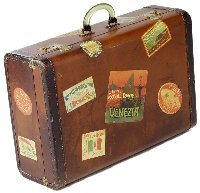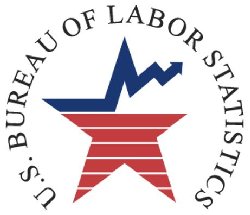BRYCE ON MANAGEMENT
- Don't leave home without it.
(Click for
AUDIO VERSION)
To use this segment in a Radio broadcast or Podcast, send TIM a request
.

Travel used to be fun and carefree; you grabbed your tickets, got on the airplane and off you went. Thanks to terrorists though, the TSA, and the dangerous world we now live in, it has become quite complicated. I have done my fair share of traveling over the years and learned a few things along the way, such as how to organize a trip with a minimum of headaches. Below is a checklist I use to mentally prepare myself. Now, I'm finally putting it to paper to perhaps make travel planning a little easier for others. This checklist is not designed to help you order tickets, only how to prepare for the trip after you have made the purchase decision. It will also not cover the items you can or cannot carry on to an aircraft (see the
TSA for guidelines). If you have a concern or question, either contact the TSA or your airline carrier. Aside from this, these suggestions will hopefully simplify your trip and make it more enjoyable. I have listed my suggestions in alphabetic order:
AIRLINE COURTESY LOUNGES - Most major airlines offer private lounges available on a membership basis. They offer comforts for the weary traveler, including beverages, snacks, privacy, television, Internet access, comfortable chairs for catching a few winks of sleep, clean washrooms, and sometimes showers. If you are going to be traveling extensively, it may be wise to purchase a membership. Don't want to join on an annual basis? Most airlines have a 30 day membership available or pay as you go. If you have a rough and rugged road to travel, it may very well be worth it. Contact your airline for details.
AIRLINE TICKETS - Make sure you have your seat assignments in advance. If you have certain food requirements, notify the airline in advance, not on the day of departure. Boarding passes can still be obtained at the airport but most people prefer printing them in advance on their computer, usually 24 hours in advance. Print two copies, just in case. TRAVEL INSURANCE may be wise if you are planning an expensive trip where there is a possibility your travel plans may change. As for me, I typically avoid it under normal circumstances.
AIRPORT - get there early. TSA usually creates unGodly security lines where you are seemingly strip searched. Wear comfortable shoes you can quickly slip in and out of, and socks to avoid the germs awaiting you in the security screening area. Avoid wearing or carrying anything metallic, particularly coins, lighters, or anything else. Try not to dress like a Huckleberry thereby indicating you're an inexperienced traveler to be taken advantage of by charlatans.
AUTOMOBILE, PREPARATION - If you are going on a lengthy trip by automobile, be sure to have your car's tires, brakes, and oil checked, and possibly have it tuned up. An ounce of prevention now, may save you headaches later on.
BALLOT - If you will be gone during election time, be sure to request an "absentee ballot" from your local board of elections.
BATTERIES - make sure all of your batteries for your electronic devices are charged or replaced. It might not be a bad idea to bring extra batteries if you are going to be gone for an extended period.
BILLS, PAYING THEM IN ADVANCE - if you are going to be gone for an extended period of time, try to have your bills paid in advance so that you will not be in arrears upon your return. If necessary, have someone you trust pay bills for you, or utilize electronic payments.
CALL HOME - upon your arrival, let your loved ones back home know that you have arrived safely, either by telephone, instant message, or e-mail.
CAMERA - Are you planning on taking pictures during your trip? Make sure your digital camera is fully charged and ready to use. Don't forget the charger and any other cords and attachments. I typically purchase a book of photos of the country I'm visiting (the local photographers are much better than I am).
CAR RENTAL - It pays to make reservations well in advance, not to mention shop around and look for specials. I tend to use reputable firms with airport shuttles as opposed to hitching a ride to East Podunk to pickup a car. Beware of insurance coverage; I tend to get minimum coverage but it is your choice. (Also see "International Driving Permit").
CASH - do not take an inordinate amount of hard cash with you. If you are robbed, it will be impossible to replace. Take enough cash for taxis or shuttles, tipping, basic "walking around" money, and perhaps a drink or something to eat along the way.
COMPUTER - If you are planning on taking your laptop, be sure you will have Internet coverage. As with the telephone, check on available coverage.
CONCIERGE - a hotel concierge can be your best friend if you treat him/her right. Let them know what your interests are and ask for their advice regarding restaurants, tourist attractions, transportation, and currency exchanges. Sometimes they may point you in the wrong direction, particularly if an outside firm is paying them a commission for every tourist they send their way. Develop a good rapport with them if possible and they will, in general, treat you right.
CREDIT/DEBIT CARDS - alert your credit/debit card companies of your travel plans. Such companies may refuse the processing of transactions from a faraway location (including within the United States). In addition, write down your credit/debit card numbers and customer service telephone numbers and keep them in a safe place. This can be invaluable if you lose your wallet or purse and need to cancel them (and get new ones).
CURRENCY EXCHANGE - try to have some local currency with you before you arrive, for use with taxi drivers, tipping, etc. You can obtain such currency through a bank, but it may be better to get it at an airport if you have some time between flights. While at your destination, check with the hotel's concierge or front desk on how to exchange money. Make sure you are getting the correct rate, realize that not everybody necessarily will charge you the same rate. Sometimes black market rates are better than those offered by the banks. For the latest rates, check
HERE.
ELECTRICAL CONVERTERS - not everything runs on the American electrical system, including plugs. Fortunately, there are inexpensive adapter plugs available for you to plug-in an American electrical device. Radio Shack provides a fine
TUTORIAL on this subject.
E-MAIL, AUTO RESPONSES - If you are going away for awhile, do not write a default e-mail response such as, "I'll be away on vacation from DATE to DATE"; Translation: "Hello burglars, the house is deserted, come and get it." Frankly, it's nobody's business where you are. Try something like this instead, "I'm away from my office right now, please contact John Doe if you require immediate support, (telephone number and e-mail address)." If possible, periodically check your e-mail while you're on the road and answer critical messages.
EMBASSY - It may be wise to write down the telephone number and address of the local American embassy or consulate. Click
HERE for a listing. (Also see "Police").
ENTERTAINMENT - you may be traveling for hours. Either plan on getting plenty of sleep during your journey or take something to occupy your time, such as a book, magazine, portable DVD player, laptop computer, or some other electronic device. On airplanes, observe the proper decorum for using such devices.
FLASH DRIVE - Don't want to lug around a laptop with you? Put a lot of your data on a simple flash drive which you can carry in your pocket. Rarely do I take a laptop with me anymore. Instead, I keep important documents, email addresses, and web bookmarks on my flash drive. You may also want to scan your passport, driver's license, tickets, and traveler checks and maintain them as JPG or PDF files on your flash drive (as opposed to photocopying such items as mentioned under "Photocopying." I also make active use of
GOOGLE DOCS/
DRIVE for documents, graphic presentations, and more, which I can easily access from any computer. Using this same rationale, I also check my e-mail using such things as
GOOGLE GMAIL or
YAHOO! MAIL.
HOTEL BUSINESS CARD - You can obtain such cards from the front desk or concierge. Take more than one. They are particularly useful for finding your way back to your hotel. If you are in a place where you do not understand the language, just hand the taxi driver the card and he'll get you home.
HOTEL ROOM KEY, LEAVE AT THE FRONT DESK - this is a custom most Americans cannot seem to grasp. By leaving your key with the front desk, you do not have to worry about losing it or having it stolen (plus it is one less thing to carry with you).
INTERNATIONAL DRIVING PERMIT - if you are planning on driving an automobile overseas, obtain an International Driving Permit in advance. In addition to allowing you to drive, it also makes a handy form of identification. You can obtain such a permit on the Internet or at
AAA. It would also pay to familiarize yourself with local rules of the road, and
ROAD SIGNS.
JET LAG - if you are traveling to distant lands, try to adjust your sleep patterns accordingly. For example, when I'm traveling to the Orient, I try to get as much sleep as possible on the aircraft to get myself on the time zone of my destination. Just remember, it is easier to adjust as you chase the sun (going from East to West) and harder when you chase the moon (West to East).
LOCAL CUSTOMS - familiarize yourself with local customs, such as greetings, forms of address, dressing for occasions, and tipping.
LUGGAGE - Try to pack lightly thereby minimizing additional baggage charges. If you are planning on shopping, take an extra collapsible bag for such sundries. Be sure that all bags have attached identification tags, including your name and address. Some people also add their mobile telephone number and e-mail address thereby expediting contact with you in the event of lost luggage. I have also found it useful to add luggage straps which keeps the bag together in the event the locks break by reckless baggage handlers. Because many bags look alike, it may pay to put something colorful on it so you can spot it easily on the luggage carrousel, perhaps a ribbon, a rag, or some tape. If you need to take unusual items such as golf clubs, fishing poles, etc. contact the airlines and ask for their advice on how to best pack them. As to carry-ons, keep it simple and small enough to fit under the seat in front of you (in case the overhead compartments are full).
MAPS - obtain in advance a map of the destination you will be visiting. Bookstores, Hotels, AAA, and other travel agencies have a plethora of them available, not to mention what you can find on the Internet. Study the map before you arrive so you know where you are going.
MEDICATION - obviously you want to bring sufficient amounts of your medications, but it is the unexpected you should take into consideration, such as coming down with a cold, motion sickness, and indigestion (particularly if the local cuisine doesn't agree with you).
NEWSPAPERS AND MAIL, HOLDING - newspapers left on a driveway is an invitation for thieves to rob your house. Either arrange to have someone pick them up for you or have them stopped. Leaving the mail in your box may expose important papers to thieves as well. Want to stop your mail, either call or visit your local post office or click
HERE.
NOTIFY a trusted neighbor, friend, or family member that you will be gone and to keep an eye on your residence. Also notify the local police.
PASSPORT - You simply cannot travel without a passport anymore, be it by ship or airplane. Driver Licenses may suffice in North America but the preferred method is to carry a passport with you at all times. You can apply for a passport at a local
post office (call them first) or check
ON-LINE. If you haven't traveled in a while, check the expiration date of your passport, maybe it is time to renew. (Also see "Visas").
PETS - If you are leaving your pets at home while you are traveling, make reservations to have them boarded or have a friend or family member take care of them. If you are taking your pets with you, check with the airlines about traveling restrictions and possibly shots. Also be sure to contact the hotel regarding their policy on pets.
PHOTOCOPY YOUR PASSPORTS, TICKETS AND TRAVELER'S CHECKS and hide them in the lining of your luggage or some other safe place. Losing such items overseas can be a painful experience. (Also see "Flash Drive").
POLICE - It might not be a bad idea to get the telephone number of the local police and carry it with you, in case of emergency of course. No, not everyone uses "911" for emergencies; the British use "999" and other European countries use "112." (Also see "Embassy").
RESIDENCE, CLOSING IT UP - make sure you have timers on lights in strategic areas of the house so it doesn't give the appearance it is deserted. Give consideration to lawn maintenance or snow removal while you're away. Also, make sure your heating or air conditioning is set at a minimal level so that you do not waste electricity (and money). It's also a good idea to turn off plumbing, particularly to toilets. Should the lines burst or leak you can be left with an expensive mess. And of course, make sure all of the windows and doors are locked and major appliances turned off.
SUNDRIES - purchase travel sized toiletries in advance, including clothes detergent if necessary to wash your socks. In all likelihood, you won't like the prices overseas. Make sure you bring sufficient medications with you. Also, if you are so inclined, take a small bottle of booze. I can assure you, it will be a lot cheaper than the hotel's mini-bar. Also bring a sufficient amount of tobacco. Better yet, you can buy such things at the Duty Free shops either at the airport or on your airplane. If you are not sure, ask the airlines regarding allowances you can purchase.
TAXIS AND SHUTTLES - Make sure you have a plan for getting from the airport to your final destination, such as your hotel. If you are going by taxi, be sure to ask how much it will cost BEFORE you get into the cab. Otherwise you might wind up on an expensive joy ride.
TELEPHONE - If you are planning on taking your cell phone or smart phone, it might be wise to see if you will have any connecting coverage at your destination. Check with your carrier and also be sure to understand any special connecting fees. Sometimes it is preferable to take a prepaid telephone card with you instead.
TRANSLATION - obtain a pocket dictionary and learn some basic words and phrases, such as "Please," "Thank you", "How much?", and "Where can I find..." Make a simple cheat sheet of common expressions, such as on an index card, and carry it with you. There are also some smart phones that now have translation "apps" available for download. Familiarize yourself with how they work before you go.
TRAVEL RECOMMENDATIONS - ask your family and friends about favorite places to visit at your destination if they have been there, including sightseeing, restaurants, and do's and don'ts.
TRAVELERS CHECKS - in this age of credit/debit cards, the use of travelers checks have diminished. However, I have always found them to be a universally acceptable form of payment. You can obtain travelers checks from your bank,
AAA, or other financial institutions.
TRIP SHEET - write out your travel agenda, along with the name of the hotel(s) you will be staying at, their address, telephone, e-mail and web addresses. Also include your travel itinerary complete with flight numbers and departure/arrival times and dates. This is useful not only for yourself, but provide a copy for your loved ones.
VISA - if you are traveling overseas, you may need an entry visa which can typically be obtained from an embassy. For a listing of country requirements, click
HERE. Some countries may also require you have certain shots which you can either get from your doctor or a medical clinic. Specific paperwork is required which is commonly attached to your passport. When getting such shots, be sure to take your passport with you. (Also see "Passport").
VOICE MAIL - As with the "E-mail" response, do not leave a voice message indicating you are away. Also, periodically check your messages.
WEATHER - check the forecast for your destination and pack clothes accordingly. Don't forget the portable umbrella.
Hopefully you will find this checklist helpful in planning your next trip. If I have overlooked something, please be sure to drop me a line with your suggestion. Now for the hard part of the trip: enjoy yourself! Bon voyage Y'all!
Keep the Faith!
Note: All trademarks both marked and unmarked belong to their respective companies.
Copyright © 2012 by Tim Bryce. All rights reserved.

 Tim Bryce is a writer and the Managing Director of M&JB Investment Company (M&JB) of Palm Harbor, Florida and has over 30 years of experience in the management consulting field. He can be reached at timb001@phmainstreet.com
Tim Bryce is a writer and the Managing Director of M&JB Investment Company (M&JB) of Palm Harbor, Florida and has over 30 years of experience in the management consulting field. He can be reached at timb001@phmainstreet.com

 I have been fortunate over the years to fish in a variety of locations throughout the country. You may remember me discussing my passion in
I have been fortunate over the years to fish in a variety of locations throughout the country. You may remember me discussing my passion in 



 You will undoubtedly encounter many different types of personalities in the work place, each with their own unique blend of nuances. But there are four basic types of personalities from which they are based, which is commonly referred to as A, B, C, and D. Although volumes have been written on such personality traits, here is a synopsis:
You will undoubtedly encounter many different types of personalities in the work place, each with their own unique blend of nuances. But there are four basic types of personalities from which they are based, which is commonly referred to as A, B, C, and D. Although volumes have been written on such personality traits, here is a synopsis:
 I wonder how much of sex education is learned through television, the Internet, and movies these days? Probably more than we know. As a result, I suspect parents spend considerably less time discussing it with their children than my generation. Back in my day, sex was a subject few people openly discussed, but I'm sure they were just as preoccupied with it. Even though "Playboy" was coming into vogue, nobody discussed such things as erectile dysfunction, social diseases, or openly joked about human sexual anatomy as they do today on prime time. Bawdy jokes were told privately or in Las Vegas. Even tampon ads in magazines were considered risque. The movie "Goldfinger" broke a lot of ground in raising sexual awareness though. Everyone knew what "Pussy Galore" meant, and still chuckle about it to this day.
I wonder how much of sex education is learned through television, the Internet, and movies these days? Probably more than we know. As a result, I suspect parents spend considerably less time discussing it with their children than my generation. Back in my day, sex was a subject few people openly discussed, but I'm sure they were just as preoccupied with it. Even though "Playboy" was coming into vogue, nobody discussed such things as erectile dysfunction, social diseases, or openly joked about human sexual anatomy as they do today on prime time. Bawdy jokes were told privately or in Las Vegas. Even tampon ads in magazines were considered risque. The movie "Goldfinger" broke a lot of ground in raising sexual awareness though. Everyone knew what "Pussy Galore" meant, and still chuckle about it to this day.
 The mantra for the Pinellas County Sheriff's Office (PCSO) is "Leading The Way For A Safer Pinellas," but in lieu of some recent facts, you have to wonder.
The mantra for the Pinellas County Sheriff's Office (PCSO) is "Leading The Way For A Safer Pinellas," but in lieu of some recent facts, you have to wonder.
 "Pay no attention to that man behind the curtain!" - The Wizard of Oz to Dorothy and her entourage.
"Pay no attention to that man behind the curtain!" - The Wizard of Oz to Dorothy and her entourage.
 Travel used to be fun and carefree; you grabbed your tickets, got on the airplane and off you went. Thanks to terrorists though, the TSA, and the dangerous world we now live in, it has become quite complicated. I have done my fair share of traveling over the years and learned a few things along the way, such as how to organize a trip with a minimum of headaches. Below is a checklist I use to mentally prepare myself. Now, I'm finally putting it to paper to perhaps make travel planning a little easier for others. This checklist is not designed to help you order tickets, only how to prepare for the trip after you have made the purchase decision. It will also not cover the items you can or cannot carry on to an aircraft (see the
Travel used to be fun and carefree; you grabbed your tickets, got on the airplane and off you went. Thanks to terrorists though, the TSA, and the dangerous world we now live in, it has become quite complicated. I have done my fair share of traveling over the years and learned a few things along the way, such as how to organize a trip with a minimum of headaches. Below is a checklist I use to mentally prepare myself. Now, I'm finally putting it to paper to perhaps make travel planning a little easier for others. This checklist is not designed to help you order tickets, only how to prepare for the trip after you have made the purchase decision. It will also not cover the items you can or cannot carry on to an aircraft (see the